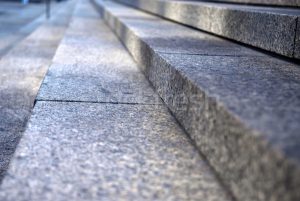
A young* man in dark slacks, white shoes, a blue button down shirt and vest walked up the steps of a library. A grand edifice equal to its holdings, the building featured a trio of main entrances and the man entered, knowingly, the one on the right with an automatic door. Past security to the bank of elevators, he waited only momentarily for the doors to open, close and transport him quickly up to the third floor. He found the PQ’s and three rows in walked all the way down the aisle, almost to the very end. He arrived at the section and began reading titles.
After a minute so poised, reading the spines as if making a selection beyond a single book he had come for, he pulled out one book, opened it, perused, but then replaced it. He took out another and put it back without opening. Then spying another on a higher shelf, he took down the book, opened it to the verso and just before letting out a startling loud sneeze, lofted the book high in one hand to avoid splattering it with the involuntary spray.
Involuntary, but not invisible. Because when quiet down the row resealed itself and he looked around and saw no one, the man spied the bit of phlegm he had caught in the other hand that covered his mouth, just as involuntarily. Now quite deliberately attempting to safeguard the books from the one soiled hand, he continued his quest for a few more minutes. When he had finally decided on a selection, the man took the book back down the long aisle. Before turning into the bank of stairs as though he studiously and by habit avoided the elevator on the way down, he turned into the men’s room just opposite the first shelf of PR’s.
Inside the empty lavatory, he shifted the book to hold it under the armpit of the left, soiled hand, while he turned on the cold water with his right. The handle was easy to turn, perhaps, easier than expected, and just as the water fired against the basin, the book came loose from the pit, as he leaned over the sink to clean his hand. Into the full spray and quickly filling basin it fell, splayed open at page 139.
He grabbed the book quickly, though damage had been done. He finished cleaning the hand and went downstairs to circulation.
“Can I help you?” the kind young woman asked.
“I….” and he proceeded to explain what had happened. She frowned, but not in the way he might have expected.
“What book is it?” she asked.
“Oh, it’s a novel by Jean Genet. It might actually have been a play…” he was saying but she shook her head.
“OH. Don’t worry about. No one reads that book,” she said.
“What do you mean?”
“I mean, it’s kind of ruined. But really, no one is going to miss it. So don’t worry about it.”
“I came here for it, to get it,” he said, as though he stood for legions.
“It’s not even in English,” she assured, of which there was no need.
“No, Genet was… it’s in French.”
“Exactly.”
“How does that matter?” he asked but exasperation began to appear on the woman’s pleasant face. She seemed so understanding. Too understanding, such that her understanding seemed worth nothing at all.
“Look at the last time it was checked out,” she instructed, with a kind of obviousness the man felt he had little encountered. “1972?”
“What difference does that make? It was about to be,” he said and looked at the women checking out a book with the next clerk down, “tied for 1st as the most recent book checked out of this library.”
“Do you want me to ask my supervisor?”
“Ask her what?”
“it’s a him,” she pointed out and now the young man began to appear exasperated.
“Okay. Ask him if you can dry off the book and lend it out to me.”
“it’s pretty wet.”
“Indeed. Tell him I’m very sorry.”
“He won’t care. He’ll just say to take it out of circulation.”
“It’s the only copy you have.”
“Was,” she corrected him. The man sighed, handed over the book and felt a sneeze coming on.
By Alan Flurry
________________________
*Relatively
